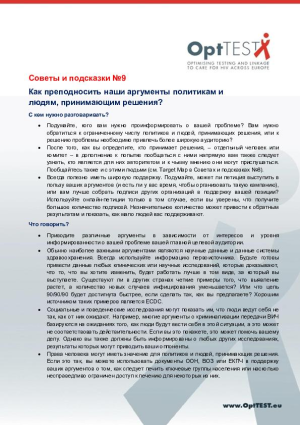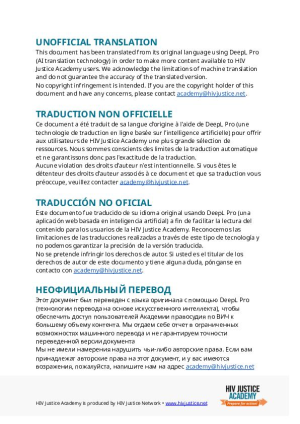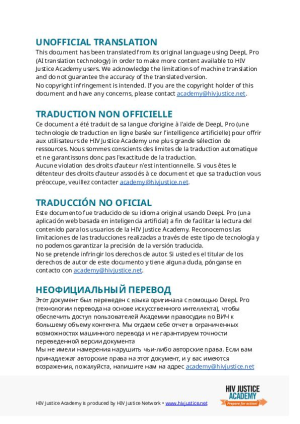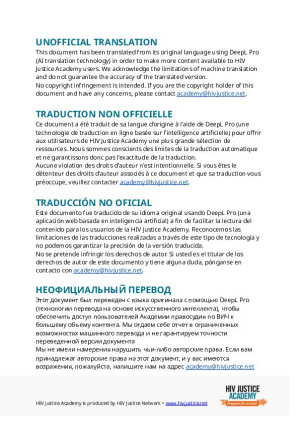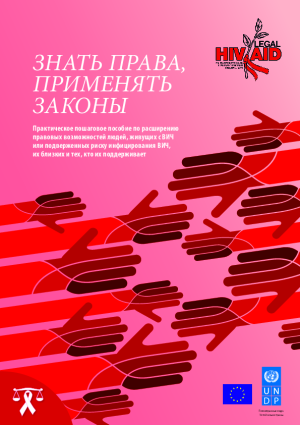OptTEST Советы и подсказки №9 – Как представлять наши аргументы политикам и людям, принимающим решения?
Изучает, как обучать лиц, принимающих решения, и политиков, лучшие способы коммуникации, как сформулировать аргументы и т.д.
Судебный справочник по ВИЧ, правам человека и законодательству в Уганде
Справочник судьи по ВИЧ, правам человека и законодательству в Уганде состоит из пяти частей, в которых рассматриваются вопросы, связанные с ВИЧ/СПИДом, и поднимаются актуальные проблемы, связанные с его существованием, которые могут повлиять на решения судей, а также возможные рекомендации для начала работы. В частности, в ней есть предыстория, в которую включен текущий статус эпидемии ВИЧ/СПИДа и ответ на нее.
- В части I изложены основы международного права и прав человека, применимые к ВИЧ/СПИДу в Уганде.
- Часть II посвящена национальному законодательству и основам прав человека, применимым к ВИЧ в Уганде.
- Часть III посвящена пробелам/проблемам/недостаткам в национальном законодательстве и системе прав человека применительно к ВИЧ и обсуждает политику в отношении ВИЧ.
- Часть IV касается криминализации передачи ВИЧ и ее негативных последствий.
- Часть V посвящена тому, о чем следует помнить при вынесении решений по делам о ВИЧ, какова должна быть позиция судебного работника, а также роль судебного работника в зале суда при рассмотрении таких дел.
Этот документ был переведен с языка оригинала с помощью DeepL Pro (технологии перевода на основе искусственного интеллекта), чтобы обеспечить доступ пользователей Академии правосудия по ВИЧ к большему объему контента. Мы отдаем себе отчет в ограниченных возможностях машинного перевода и не гарантируем точности переведенной версии документа
Центрирование здоровья, уважение прав: Учебное пособие для полиции
Данное учебное пособие основано на современных научных данных и лучших практиках, связанных с обучением полицейских и обучением по вопросам здоровья и безопасности в связи с ВИЧ и ВГС. Оно предназначено для использования полицейскими департаментами, чтобы помочь им в выполнении своих профессиональных обязательств по обеспечению более безопасного обслуживания людей, живущих с ВИЧ и/или ВГС и затронутых ими.
Этот документ был переведен с языка оригинала с помощью DeepL Pro (технологии перевода на основе искусственного интеллекта), чтобы обеспечить доступ пользователей Академии правосудия по ВИЧ к большему объему контента. Мы отдаем себе отчет в ограниченных возможностях машинного перевода и не гарантируем точности переведенной версии документа
Верховный суд, Вторая уголовная палата, решение 690/2019 от 11 марта. 2020, Rec. 1807/2018
ИНЖЕНЕРЫ. Передача ВИЧ в случаях, когда инфицированный человек знал о болезни своего партнера. Заявительница знала, что ее партнер является носителем ВИЧ, поэтому, согласившись вступить с ним в сексуальные отношения, без какой-либо профилактики, передача заболевания не заслуживает уголовного упрека. Внешнее свидетельство болезни, которую заявительница должна была воспринять, поскольку ей самой поставили диагноз несколько месяцев спустя, и ни после этого диагноза, ни когда она сообщила о предполагаемом нападении, она не делала никаких намеков на заразность болезни. In dubio pro reo. Самоуничтожение самой заявительницы.
ВС отклонил кассационную жалобу, поданную на приговор провинциального суда Мадрида, и оставил в силе обвинительный приговор за преступление, связанное с причинением тяжких телесных повреждений вследствие ВИЧ-инфекции.
Знать права, применять законы
Практическое пошаговое пособие по расширению правовых возможностей людей, живущих с ВИЧ или подверженных риску инфицирования ВИЧ, их близких и тех, кто их поддерживает. Здесь описываются основные принципы права и юридической практики, которые каждый может и должен использовать для того, чтобы защитить свои права или права представителей уязвимых групп. Пособие направлено на то, чтобы вдохновить людей защищать свои права, показав, что это возможно, и что есть много людей, которые уже занимаются подобной деятельностью.

